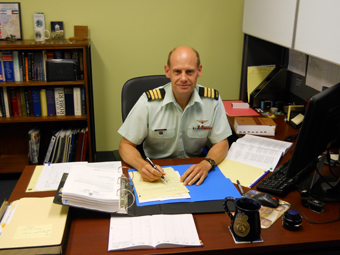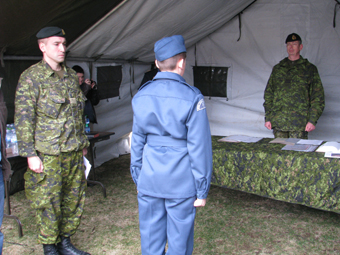ARCHIVED - Chapter 3: Our Military Justice System

Before proceeding to court martial, charges are reviewed by military prosecutors to determine whether there is a reasonable prospect of conviction, and whether it is in the public interest to proceed.
Canada’s military justice system is a separate and parallel system of justice that exists within and forms an integral part of Canadian law. It shares many of the same underlying principles with the civilian criminal justice system, and it is subject to the same constitutional framework including the Canadian Charter of Rights and Freedoms. Indeed, the military justice system is expressly recognized in the Charter. It is committed to fairness, equality before the law, and the fundamental values of justice and due process. The necessity and legitimacy of the system have, on several occasions, been affirmed by the Supreme Court of Canada (SCC).
Importantly, where the military justice system differs from its civilian counterpart is in its objectives. In addition to ensuring that justice is administered fairly and the rule of law is respected, the military justice system is also designed to promote the operational effectiveness of the Canadian Armed Forces (CAF) by contributing to the maintenance of discipline, efficiency, and morale. These dual objectives of discipline and justice give rise to many of the substantive and procedural differences that properly distinguish the military system from the civilian system.
The ability of Canada’s military to operate effectively depends on the ability of its leadership to instil and maintain discipline. While training and leadership are central to the maintenance of discipline, the chain of command must also have a legal mechanism that it can employ to investigate and sanction disciplinary breaches that require a formal, fair, and prompt response. As the SCC observed in 1992, in R. v. Généreux, “breaches of military discipline must be dealt with speedily and, frequently, punished more severely than would be the case if a civilian engaged in such conduct. […] There is thus a need for separate tribunals to enforce special disciplinary standards in the military.
” The military justice system is designed to meet those unique needs articulated by the SCC.
The Structure of the Military Justice System
Code of Service Discipline and Service Offences
The Code of Service Discipline (CSD), set out at Part III of the National Defence Act (NDA), is the foundation of the Canadian military justice system. It sets out disciplinary jurisdiction and describes service offences that are essential to the maintenance of discipline and effectiveness. It also sets out the punishments, powers of arrest, and the organization and procedures for service tribunals, appeals, and post-trial review. The term “service offence” means “an offence under the National Defence Act, the Criminal Code, or any other Act of Parliament, committed by a person while subject to the Code of Service Discipline.
” Thus, service offences include many offences that are unique to the profession of arms, such as disobedience of a lawful command, absence without leave, and conduct to the prejudice of good order and discipline, in addition to more conventional offences that are created by the Criminal Code and other Acts of Parliament. The diverse scope of service offences that fall within the CSD permits the military justice system to foster and promote the dual ideals of discipline and justice within the CAF.
Members of the Regular Force of the CAF are subject to the CSD at all times and in all places. Additionally, members of the Reserve Force are subject to the CSD in circumstances specified under the NDA. Civilians may also be subject to the CSD in limited circumstances.
Investigations and Charge Laying
Where there are reasons to believe that a service offence has been committed, an investigation is conducted to determine whether there may be sufficient grounds to lay a charge. If the complaint is of a serious or sensitive nature, the Canadian Forces National Investigation Service (CFNIS) will examine the complaint and investigate as appropriate. Otherwise, investigations are conducted by Military Police or by non-Military Police CAF members at the unit level.
An officer or non-commissioned member having authority to lay a charge is required to obtain advice from a legal officer from the Office of the Judge Advocate General (JAG) before laying a charge in respect of an offence that is not authorized to be tried by summary trial under regulations, is alleged to have been committed by an officer or a non-commissioned member above the rank of Sergeant or, if a charge was laid, would give rise to a right to elect to be tried by court martial. The legal advice shall address the sufficiency of the evidence, whether or not in the circumstances a charge should be laid and, where a charge should be laid, the appropriate charge.

A simulated summary trial with Legal Officers in support of Law Day 2011 in Halifax, for the benefit of cadets and members of the public.
Summary Trials
The summary trial is the most commonly used form of service tribunal. During the reporting period, there were 1423 summary trials, representing 96% of all service tribunals. The summary trial process usually allows for more minor service offences to be tried and disposed of by the unit.
Summary trials are presided over by commanding officers, delegated officers, or superior commanders. The commanding officer who normally exercises jurisdiction is the commanding officer of the accused person. A delegated officer is an officer to whom a commanding officer has delegated powers of trial and punishment with or without limitations. Superior commanders may try officers below the rank of Lieutenant-Colonel and non-commissioned members above the rank of Sergeant. Before presiding over summary trials, these officers must be trained in the administration of the CSD and be certified as qualified to perform these duties by the JAG.
The jurisdiction of officers presiding at summary trial over accused persons is limited by the type of offences that presiding officers may try. The disposition of charges by summary trial is also meant to occur expeditiously. Accordingly, a presiding officer may not try an accused person by summary trial unless the trial commences within one year after the day on which the service offence is alleged to have been committed.
The procedures at a summary trial are straightforward and the powers of punishment are limited in scope. This restriction on the severity of punishments reflects both the often minor nature of the offences involved, and the intention that the punishments be primarily corrective in nature. As soon as possible after a charge has been laid, an assisting officer is appointed under the authority of a commanding officer to assist the accused in the preparation of his or her case and during the trial.
All offenders found guilty at summary trial have the right to request a review of a finding and/or punishment imposed. The findings and punishment may also be reviewed on the independent initiative of a review authority. The review authority is a more senior officer in the chain of command designated by regulations. Legal advice must be obtained by the review authority before making a determination in respect of the review.
Although the summary trial is the predominant type of service tribunal, there are offences which an officer presiding at summary trial has no jurisdiction to deal with, and that must therefore be tried by court martial. Some cases may also be too serious or complex to be dealt with by summary trial. In those cases, the matter will be forwarded to the Director of Military Prosecutions, who will decide whether to prefer charges for trial by court martial.
Except for cases involving a limited number of prescribed offences whose surrounding circumstances are sufficiently minor (for example, cases of insubordinate behaviour, absence without leave, and drunkenness), or those cases where there is no jurisdiction to deal with specific offences at summary trial, an accused person, by right, will be offered an election to be tried by court martial. Before exercising this right, the accused will have the opportunity to consult with legal counsel from Defence Counsel Services before making this election. During the reporting period, accused members elected trial by court martial 55 times out of the 554 cases (9.93%) in which an election was offered. The relatively low number of elections for trial by court martial is consistent with past years, and continues to be indicative of the perceived fairness of the summary trial process.
Courts Martial
The court martial – a formal military court presided over by a military judge – is designed to deal with more serious offences. During the reporting period, 61 courts martial were held. Courts martial are conducted in accordance with rules and procedures similar to those of civilian criminal courts and have the same rights, powers and privileges as a superior court of criminal jurisdiction with respect to all “matters necessary or proper for the due exercise of its jurisdiction.
”
At a court martial, the prosecution is conducted by a legal officer appointed by the Director of Military Prosecution. The accused is entitled to have legal counsel appointed by the Directorate of Defence Counsel Services for no cost to the accused, or, at his or her own expense, by civilian counsel; the accused can also choose not to be represented by a lawyer.
The NDA provides for two types of court martial: General Courts Martial and Standing Courts Martial. The General Court Martial is composed of a military judge and a panel of five CAF members. The panel of CAF members is selected randomly and is governed by rules that enhance the specific character of military panels. At a General Court Martial, the court martial panel makes the finding on the facts and the military judge makes all legal rulings and imposes the sentence. Panels must reach unanimous decisions on findings of guilty. At a Standing Court Martial the military judge sits alone and makes the findings and where the person is convicted, imposes a sentence.
Appeal of a Court Martial Decision
Decisions made at courts martial may be appealed to the Court Martial Appeal Court of Canada (CMAC), a court composed of selected civilian judges from the Federal Court of Canada and the Federal Court of Appeal, as well as civilian judges of the Superior Courts and Courts of Appeal of the Provinces and Territories designated or appointed by the Governor in Council. Both an accused tried by court martial and the Minister of National Defence may appeal to the CMAC.
CMAC decisions may be appealed to the Supreme Court of Canada on any question of law on which a judge of the CMAC dissents, or on any question of law if leave to appeal is granted by the Supreme Court of Canada.
A complete overview of military justice statistics during the 2011-2012 reporting period is provided at the Annex of this report.